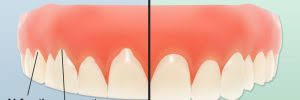 We should probably start off by letting you know that “bruxism” is actually a fancy term used to describe excessive grinding of the teeth, usually at night—but it can also occur during the day. It can be difficult to know if you are grinding your teeth while you are asleep because…well, you are asleep. Visiting your dentist regularly will help with detection. We will be able to detect, based on tooth wear or even breakage, if you are clenching your teeth at night. There are also a few symptoms you should be aware of so you can keep an eye out for bruxism too:
We should probably start off by letting you know that “bruxism” is actually a fancy term used to describe excessive grinding of the teeth, usually at night—but it can also occur during the day. It can be difficult to know if you are grinding your teeth while you are asleep because…well, you are asleep. Visiting your dentist regularly will help with detection. We will be able to detect, based on tooth wear or even breakage, if you are clenching your teeth at night. There are also a few symptoms you should be aware of so you can keep an eye out for bruxism too:
- Headaches—Research shows that people with bruxism are three times more likely to suffer from headaches. Because of their close proximity to the jaw, these headaches typically start around the temple.
- Facial myalgia—which is an aching jaw or facial tissue
- Ear Aches
- Tightness or stiffness of the shoulders
- Limitations of mouth opening
- Sleep disruption
- Excessive tooth movement within the gums
- Inflamed and receding gums
If you have Temporomandibular Joint Disorder—TMJ for short—you might recognize a lot of these symptoms. Bruxism can actually cause TMJ, and if you have TMJ you are more than likely also grinding your teeth.
The medical community does not yet fully understand all the causes of bruxism, but there is a statistical connection between stress, alcohol, nicotine, and caffeine. Some of these factors may be a lot easier to stay away from than others. As always, we are going to suggest that if you smoke you should stop (we should probably put “Don’t smoke” in every blog we write). Limiting your alcohol and caffeine intake will help you sleep more soundly, which in turn can help minimize grinding. Stress is a hard one. Who wouldn’t want to lessen their stress? Self-care techniques like meditation and breathing exercises can help, or you can take a quick walk before going to bed.
If you are unable to cut coffee or stress out of your life, or if you just want some added protection, Farber Center can help! When visiting your hygienist or dentist mention if you are experiencing any of the symptoms listed above. We would be able to create an occlusal splint made specifically for the alignment of your teeth. Occlusal splints go by many names—such as bite guards or bite plates—but are most commonly referred to as night guards. Much like a sports mouth guard protects your teeth from breaking, a night guard will stop the contact between your teeth.
It can be difficult to stop grinding your teeth. That doesn’t mean it is a lost cause. Protect your teeth, your smile, and your gums with a night guard crafted specifically for your teeth!
Comments are closed.
